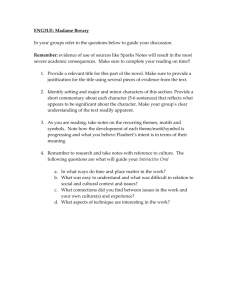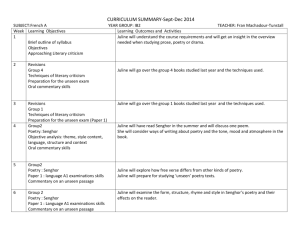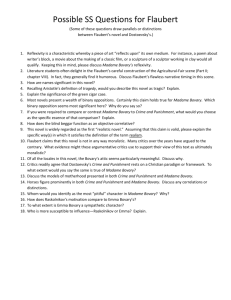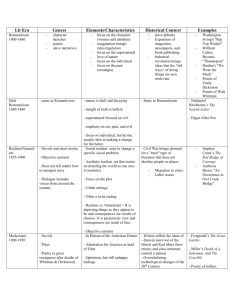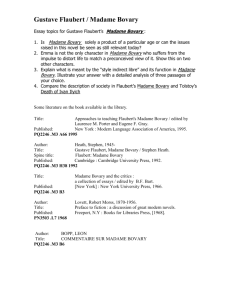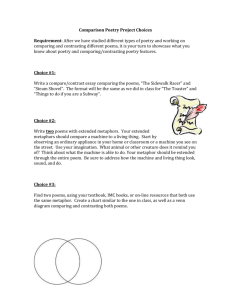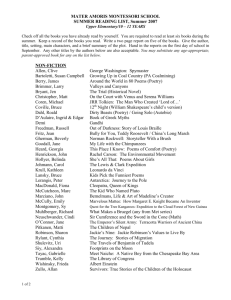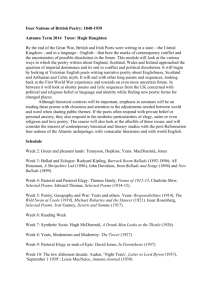OLT 321 COURSE OUTLINE 87.8 Kb
advertisement
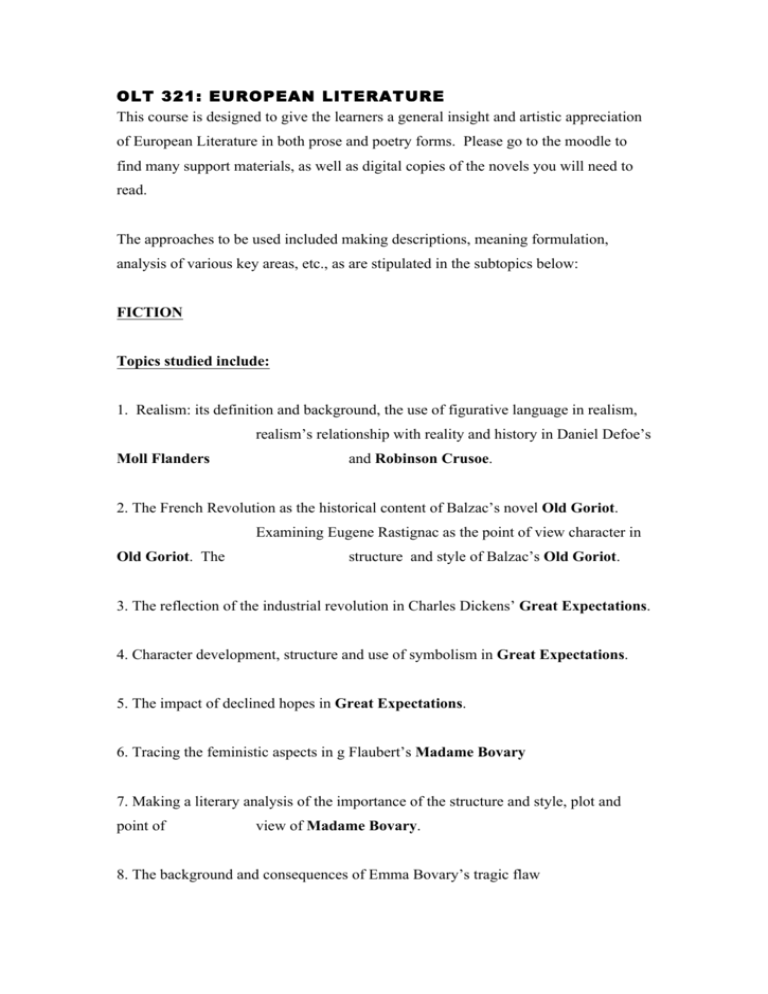
OLT 321: EUROPEAN LITERATURE This course is designed to give the learners a general insight and artistic appreciation of European Literature in both prose and poetry forms. Please go to the moodle to find many support materials, as well as digital copies of the novels you will need to read. The approaches to be used included making descriptions, meaning formulation, analysis of various key areas, etc., as are stipulated in the subtopics below: FICTION Topics studied include: 1. Realism: its definition and background, the use of figurative language in realism, realism’s relationship with reality and history in Daniel Defoe’s Moll Flanders and Robinson Crusoe. 2. The French Revolution as the historical content of Balzac’s novel Old Goriot. Examining Eugene Rastignac as the point of view character in Old Goriot. The structure and style of Balzac’s Old Goriot. 3. The reflection of the industrial revolution in Charles Dickens’ Great Expectations. 4. Character development, structure and use of symbolism in Great Expectations. 5. The impact of declined hopes in Great Expectations. 6. Tracing the feministic aspects in g Flaubert’s Madame Bovary 7. Making a literary analysis of the importance of the structure and style, plot and point of view of Madame Bovary. 8. The background and consequences of Emma Bovary’s tragic flaw 9. Describing the search for happiness of meaning of life in Madame Bovary and Camus’ The Outsider. 10. The criminal mentality, marriage and family in Dostoyevsky: The double, Notes from the Underground, and Tolstoy’s Happy ever after. 11. Outline the background and effects of moral decline in The Death of Ivan Ilyitch (Tolstoy). 12. Tracing modernism (as a movement) in Kafka’s The Trial. 13. Literary trends: modernism, social realism and post-modernism in Barnes’ Flaubert’s parrot, Gorky’s Mother and Kafka’s The Trial on issues like definitions, features, and their contributions to European prose fiction. FICTION LECTURES: Lecture 1: Realism and the rise of the European Novel Lecture 2: Honoré de Balzac’s Old Goriot Lecture 3: Balzac’s Old Goriot Lecture 4: The theme of Fatherhood in Old Goriot Lecture 5: Gustave Flaubert’s Madame Bovary Lecture 6: The structure and style of Madame Bovary Lecture 7: Emma Bovary’s romantic quest Lecture 8: Dostoyevsky: His life and work Lecture 9: Dostoyevsky’s The Double and Notes from the Underground Lecture 10: The life and work of Leo Nikolayevich Tolstoy Lecture 11: Tolstoy’s Happy ever after, The Cossacks and The Death of Ivan Ilych Lecture 12: The life and work of Charles Dickens Lecture 13: Dickens’ Great Expectations Lecture 14: Trends in 20th century fiction Kafka’s The Trial, and Orwell’s Nineteen eighty-four POETRY Topics studied include: 1. Distinguishing narrative and lyrical poetry in the European poetic tradition. 2. Tracing the emergence of the romance as a literary artistic form in European poetry. 3. Discussing the major thematic concerns of metaphysical and romantic poetry basing on areas like love, man and God, etc. in the works of William Blake, P. B. Shelley, J. Keats, Bertold Brecht, Wordsworth, etc. 4. Realism in Alexander Pushkin’s poem The Prophet 5. The relationship of Vladimir Mayakovski to the revolution of 1917 as shown in his poems: -To answer -My soviet passport 6. Artistic concerns of W. B. Yeats as shown in: -Down by the Salley Gardens -Words 7. Making a critical appreciation of Yeats’ poetic style in the poem No Second Try 8. Identification of style in: -T. S. Eliot’s poems The Love Song of J. Alfred Prufrock and The Wasteland The Wasteland and Ash Wednesday, and Portrait of a Lady on areas such as language use, sound patterns imagery and use of allusion 9. Examining form and content in B. Brecht’s poems -Ballad of the pirates -A bed for the night POETRY LECTURES: Lecture 1: Background to European Poetry The Epic The Romance The Sonnet The Renaissance Lecture 2: Metaphysical Poetry Thematic Concerns Lecture 3: Metaphysical Poetry Theme of Love Theme of Man and God Paradox Imagery Rhythm and Rhyme Lecture 4: Romantic Poetry- the background What is Romanticism? Lecture 5: Romantic Poetry- English Romantics William Blake Lecture 6: Romantic Poetry- English Romantics (part 2) William Blake (part 2) William Wordsworth Samuel Coleridge P. B. Shelley John Keats Lecture 7: Alexander Pushkin Romanticism and Realism Poems on the Decembrists Love lyrics The Role of the Poet Lecture 8: Willam Butler Yeats Life and work Traditional sources Stylistic Aspects Lecture 9: W. B. Yeats (part 2) Love poems Nationalistic concerns World civilization concerns Lecture 10: Bertold Brecht: Life and work Phase One: poems ‘Song of the Fort’ and ‘Donald Railroad Gang’ Phase Two: ‘Ballad of the Pirates’ and ‘A Bed for the Night’ Phase Three: ‘Pride’ Lecture 11: T. S. Eliot Life and work Poems: The Love Song of J. Alfred Prufrock Style Language Sound Patterns Imagery Allusion Portrait of a Lady Lecture 12: Vladimir Mayakovsky Russian futurism His life and work Lecture 13: V. Mayakovsky Poems: What about you? Kindness to horses Order No. 2 to the Army of Ants Contagious Cargo My Soviet Passport Assessment: Students are evaluated by two examinations. Works (MOST OF THESE ARE AVAILABLE FOR FREE ONLINE; YOU MAY ALSO FIND THEM IN THE MOODLE FOR THE COURSE, WHERE YOU MAY DOWNLOAD THEM AS WELL. ADDITIONAL RESOURCES ARE AVAILABLE ON THE MOODLE FOR OLT 321). Balzac, Honoré de Old Goriot Barnes , Julian Flaubert’s parrot Pan Books 1985 Brecht, Berthold Ballad of the pirates; A bed for the night Camus, Albert The outsider Penguin 1973 Defoe, Daniel Moll Flanders; Robinson Crusoe Dickens, Charles Great Expectations Penguin 1980 Dostoyevsky, Fyodor Notes from the underground and The Double Penguin 1973 Eliot, T.S. The Love Song of J. Alfred Prufrock; The Wasteland; Ash Wednesday Flaubert, Gustave Madame Bovary Gorky, Maxim Mother 1974 Kafka, Franz The Trial Penguin 1971 Mayakovski, Vladimir To answer; My soviet passport Tolstoy, Leo Happy ever after Penguin 1980 The death of Ivan Ilych Penguin 1971 Yeats, W. B. No Second Try; Down by the Salley Gardens; Words Watson, George The story of the novel Macmillan 1979 Watt, Ian The rise of the novel Berkeley 1971
